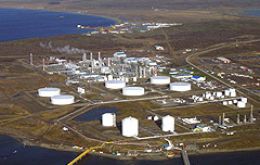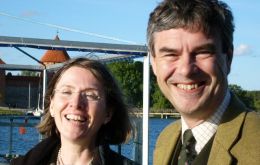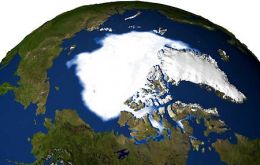MercoPress. South Atlantic News Agency
Stories for September 2009
-
Friday, September 4th 2009 - 13:26 UTC
Chilean female voters split evenly between leading presidential candidates

Female voters are split practically evenly between the two Chilean leading presidential candidates, according to a new poll from human rights organization Corporación Humanas.
-
Friday, September 4th 2009 - 13:12 UTC
Chile determined to boost natural gas production in Magallanes

A full fledged effort to search for more natural gas in the extreme south of Chile has been undertaken by the Chilean government and the private sector. The plan anticipates the drilling of 22 new wells, 120 kilometres to the north east of Punta Arenas in the Dorado-Riquelme quadrant, which already has a daily production of 450.000 cubic metres.
-
Friday, September 4th 2009 - 12:57 UTC
Recovery on sight, but bumpy road ahead, warns ECB chief

The European Central Bank declared Thursday that the economic contraction in Europe is coming to an end and kept interest rates on hold at 1%. However, the ECB's president, Jean-Claude Trichet, warned the recovery will be bumpy, especially in the face of high unemployment in Europe which is now 9.5%.
-
Friday, September 4th 2009 - 10:24 UTC
US lifts restrictions and allows unlimited visits to relatives in Cuba

United States citizens with relatives in Cuba can send them unlimited cash and visit the island as long and often as they would like under new rules from President Barack Obama’s administration.
-
Friday, September 4th 2009 - 10:05 UTC
Falkland Islands: Weekly Penguin News Update

Headlines: Nigel our new man at the Big House; Threat to Airbridge; Next of kin trip.
-
Friday, September 4th 2009 - 09:37 UTC
Ring of scandals leaves Uruguay’s telecoms company acephalous

Uruguay’s government telecommunications company Antel was left headless following several scandals that forced the resignation of the president and vice-president of the board.
-
Friday, September 4th 2009 - 09:24 UTC
Rio do Janeiro and Buenos Aires among world’s ten happiest cities

Brazil’s Rio do Janeiro and Argentina’s Buenos Aires open and close the Forbes list of the world’s ten happiest cities according to a recent survey conducted by policy advisor Simon Anholt and market researcher GfK Custom Research North America.
-
Friday, September 4th 2009 - 09:09 UTC
In spite of August surge, Uruguay expects 2009 inflation to be below 7%

Uruguay’s retail inflation jumped an unexpected 1.23% in August, the highest in the last 14 months, totalling 5.11% in eight months and 7.28% in the last twelve months. If the tendency is confirmed during the last four months of 2009, the consumer prices index would be above the Central Bank’s upper target of 7%.
-
Friday, September 4th 2009 - 09:08 UTC
Rio do Janeiro will have Latinamerica’s largest marine aquarium

Brazil’s Rio de Janeiro city will build the largest marine aquarium in Latinamerica, municipal authorities announced on Wednesday. To be named AquaRio, the aquarium is part of a plan to revitalize the city.
-
Friday, September 4th 2009 - 08:16 UTC
Arctic temperatures are at their highest in the last 2.000 years

Arctic temperatures are now higher than at any time in the last 2,000 years, research reveals. Changes to the Earth's orbit drove centuries of cooling, but temperatures rose fast in the last 100 years as human greenhouse gas emissions rose, writes BBC environment correspondent Richard Black.
